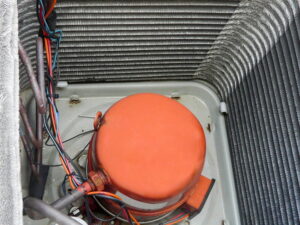The “dead compressor” is one of the worst things that can happen to your air conditioning system. That’s because the compressor is a major–and thus a costly–component of the system. Your AC simply cannot function without a working compressor.
When a compressor fails, some HVAC companies will recommend replacing the entire system. But this isn’t always necessary. If you’re wondering, “Can an AC compressor be replaced,” you’ve come to the right place. Let’s look at 3 possible options for when an AC system’s compressor has failed.
What is an AC compressor?
The AC compressor is the heart of your air conditioning system. It’s where energy is applied to the refrigerant to change it into a high-pressure gas so that it can carry out the heat exchange cycle that cools down your home. It helps to think of it as the heart of the system that’s responsible for pumping the “blood” throughout the system. When the compressor dies, your system has essentially been reduced to a large central fan.
What causes the compressor to fail?
You might be frustrated about why your compressor failed in the first place. Let’s go over the possible causes of a dead compressor.
- Loss of refrigerant: This is the most common cause for the compressor to fail. When refrigerant leaks, there’s not enough refrigerant in the system and it’ll cause the compressor to overhear.
- Too much refrigerant: If too much refrigerant is added to the system, it’ll get into the compressor and cause it to fail. This is why you should never let anyone but a professional top off your refrigerant levels.
- Loss of motor lubricant: A lack of lubrication is certain to cause an early death in any complex piece of machinery with moving parts. During annual maintenance, technicians will check on the compressor and lubricate its motor if needed.
- Dirty coils: The outdoor coils in the condenser unit can become caked with dirt, dust, and grass which increases pressure in the system and can lead to compressor failure.
- Blocked suction line: When the refrigerant lines are blocked, it raises pressure in the system and can lead to a backup of refrigerant.
What are my options?
Here are the four options a reputable HVAC contractor can discuss with you to help you choose the best option for a dead compressor.
- Option 1: Replace the Compressor: If your AC is still under warranty, replace the compressor. However, if the compressor isn’t under warranty, this component is very expensive. For an older AC system, it just doesn’t make good financial sense to just replace the compressor when you can replace the entire system and have a new, energy-efficient AC that’ll last for 10-15 years.
- Option 2: Replace the Condenser: The condenser is the outdoor unit that houses the compressor, the condenser fan, and the condenser coil. However, we usually don’t recommend this because you’ll have a mismatched system with old parts trying to keep up with new ones.
- Option 3: Replace the Air Conditioner: Replacing the AC system with a new one can be more cost-effective. You’ll have a brand-new AC covered by a warranty that’ll last for 10-15 years.
You can always count on us for an honest opinion on what to do about a dead compressor.
Don’t let the weather get you down, call Brown’s! Brown’s Heating & Cooling is your trusted resource for quality AC repair. Contact us today!

